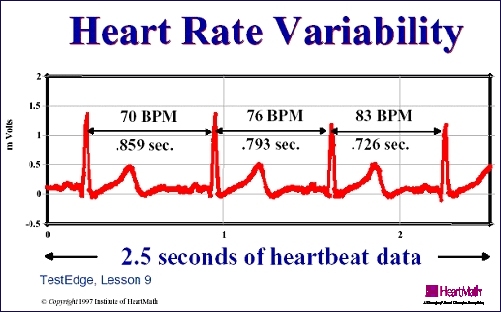HRV and Me
Heart Rate Variability is a cool tool if you are interested in learning more about how you body responds to training or you find yourself struggling to make progress and you aren't sure if it is due to under-recovering, or not pushing yourself hard enough.
I have always been an avid reader, especially when it comes to topics that I am passionate about, like strength training and nutrition. I try to read as much as I possibly can on the topic of strength training; the hard part is avoiding paralysis by analysis. But I digress.
I like to know as accurately as possible how my body is responding to training. The more insight you get into how your training is working or not working, the more you can make improvements regardless of what your goals are.
Heart Rate Variability 101
While we often think of our heart rate as a uniform single number in beats per minute, there are in fact slight variations within that number due to nervous system response as we inhale and exhale. Heart Rate Variability (HRV) essentially measures these variations between inhaling and exhaling and is usually recorded first thing upon waking while standing or sitting. It is thought that drops in your HRV from your baseline measurement suggests you are beginning to burn yourself out from training and approaching overtraining, and at or above baseline (established when deloaded from training) means you are either well recovered or not doing enough with your training.
You can read more about HRV here

HRV training uses a heart rate monitor chest strap, like runners wear, and software that charts your daily HRV measurements, and comparing your measurement to your baseline, it suggests if you should take it easy during training, go a little easier than planned, or go full boar ahead as planned, or even push it harder than planned. Having come across HRV training before, I thought that it was more applicable to endurance based athletes. I recently revisited the topic after having heard that some strongman athletes are starting to implement it to help them better understand their adaptations to training. I decided to purchase a compatible heart rate monitor and the ithlete HRV software as a birthday present to myself to test the validity of the science out for myself. This is my experience over the three months that I have been testing it out.
While I have not necessarily been adjusting my training based on my HRV results each day, I am still observing how each day of training or recovery affects my scores. My baseline when first starting out with measuring HRV was quite low, which I mostly attribute to some sleep problems that I covered in my sleep apnea post. What I noticed from tracking HRV was how heavy or light training sessions affected the values the following few days and how rest days affected the values. When my HRV score was high compared to baseline going in to training sessions, the sessions felt relatively easier, in that I didn’t have to struggle as much in order to hit my training numbers for the day. In some instances, on days where my HRV was high going in to training sessions, I was even able to surpass my training goals with ease. On days when my HRV number was lower than baseline, my training was more of a struggle to get through than normal.
Following heavier training days, there was typically an expected drop in HRV values for a day or two. If I felt really beat up and sore from a training session, this was usually represented by a greater drop in HRV. On speed days, or lighter training days, there was often little change in HRV on the following days and sometimes HRV would slightly increase after these days. Off days would often bring HRV up a few points, but any more than a few days off in a row and HRV would either plateau or start to drop a few points, which tells me that it is good to keep active and promote your body to recover.
As my sleep started to improve over the first month while I was tracking HRV, I noticed that my HRV baseline also progressively improved in a similar fashion. This stands out to me as indicating just how critical sleep is for recovery and health. Not really the most Earth-shattering revelation, but it is pretty cool to see sleep actually working for me for a change!
I’ve started to trust in the HRV readings more, as they very accurately coincide with how I perceive myself to be feeling day to day. I’ve been following a modified cube method for strongman for almost a year now and the great thing about it is that you can train week after week without a deload because of the rotation in the schedule. Following HRV readings I would see very little fluctuations and very seldom would I go into the “red zone” of approaching overtraining. For this reason I am now trying to push myself further in training to see what my limitations are and to ideally progress at an increased rate.
If you have any more questions about HRV or experiences of your own, feel free to comment below!
Fortissimus

